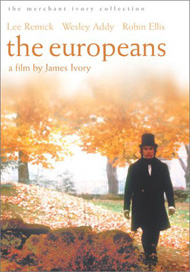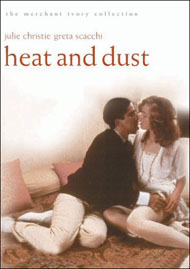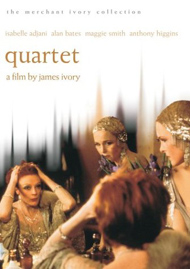| Release List | Reviews | Price Search | Shop | Newsletter | Forum | DVD Giveaways | Blu-Ray/ HD DVD | Advertise |
| Reviews & Columns |
|
Reviews DVD TV on DVD Blu-ray International DVDs Theatrical Reviews by Studio Video Games Features Collector Series DVDs Easter Egg Database Interviews DVD Talk TV DVD Talk Radio Feature Articles Columns Anime Talk DVD Savant HD Talk Horror DVDs Silent DVD
|
DVD Talk Forum |
|
|
| Resources |
|
DVD Price Search Customer Service #'s RCE Info Links |
|
Columns
|
 |
Quartet
|
||||
Quartet is an intense and almost perfectly made period picture set in 1920s Paris. The Merchant/Ivory/Jhabvala team have their style down pat. Their characters are compelling, the drama adult and uncompromising and the period atmosphere beautifully rendered. We believe we're among a wealthy art-commerce clique of the time. This story of two spoiled English snobs ruining the life of a young Frenchwoman is like a book you can't put down.
Through Jean Rhys' autobiographical novel, James Ivory captures a different view of the 1920s in Paris. There are no carefree bohemians here and no Lost Generation types wallowing in romanticism. Instead, we have a pained look at how a real mènage á trois functions. The story is told from the young Marya's point of view. With her husband in jail she has no choice but accept the generosity of the Heidlers, a polite couple who would never for a minute believe how boorish, arrogant and abusive they are. What seems like charity is really a trap of the so-called enlightened rich doing a favor for yet another "fallen creature" in Paris society. From the moment she's under their roof, Marya is reminded that she can't possibly have anything more to do with her incarcerated husband, who may not have been guilty. Yet the Heidler's friends are nothing but a pack of spoiled snobs nursing the illusion that they have rights over other people. Worse, the charity is only a cover for a perverse arrangement H.J. Heidler has in mind. The weak-willed Lois goes along with her husband's oppressive plan, almost relishing the martyrdom it affords her. The horror of it all is Marya's disillusion when she learns that her benefactors are unconcerned with her own feelings and needs. She's expected to be a grateful and obedient tart, always respecting the imperative that the Heidler's social appearances not be compromised. Once again, the Merchant/Ivory/Jhabvala casting is against expectations. Maggie Smith is impressive in a complex role that few actresses wanted. Alan Bates is unafraid to play a loathsome gentleman villain. Isabelle Adjani is almost painfully beautiful, and her descent into helpless servitude is darkly fascinating. Anthony Higgins expresses a quiet desperation as the husband fearing what's happening to his wife while he's locked away. The painstakingly shot picture uses the team's experience with period re-creation to skip what's unnecessary and embrace details that best express the '20s. The nightclubs are smoky and small, and the black jazz band with its plump singer really seems like something that one might have found in Paris of the time. There are hoity-toity bars and cheap dives where the Heidlers wallow to pretend they're part of the sophisticated set. Overall, the story moves in a depressing direction. The Heidlers succeed in making Marya into the slut they presume all poor girls in Paris to be. She loses control over herself and also loses the respect of her husband. This isn't Zola so the story doesn't end in total annihilation, but it's no triumph of the human spirit either. Quartet doesn't suggest any solution for Marya's grief. The best aspect of Quartet will frustrate some modern viewers. Marya isn't idealized or given the instincts of an emancipated soul. When Lois Heidler assails her with her spirit-crushing views - "You aren't responsible for yourself, we know better," "You can't possibly think you owe that man in jail anything," "I think you owe it to us to come to the country this weekend" - Marya's silence indicates that she has no defense and cannot assert herself. The famous 1920s women who defied the system or prevailed over social injustice were ususally independently wealthy. Marya is broke and hungry. It isn't like she has the option of supporting herself without aid from some quarter. Most women then just couldn't act independently without being looked upon as having low morals. The one job offer she gets is with a pornographer (Pierre Clementi, in a tiny cameo) who mistreats his 'models'. Quartet doesn't shy away from hard-edged content. The porn studio isn't quaint or cute, and it earns the film a very hard "R". It's easy to find movies that place contemporary attitudes in period settings to make the past more understandable to modern audiences. Quartet recreates a 1920s Paris that operates under its own rules, one that requires a certain sensitivity to appreciate. Home Vision's series of Merchant/Ivory/Jhabvala films continues with this sterling disc of Quartet, beautifully transferred with an enhanced picture and rich, dark colors. Pierre Lhomme's exacting cinematography shines in the smoky bars and overcast streets. The audio is bright and clear. In a lengthy interview the filmmakers go into every detail of the production, including background information on the author of the original book. As the series continues it's becoming obvious that theirs is a very special partnership with accomplishments that go far beyond Anglo-Indian dramas and polite period adaptations. They talk about the difficulty (in 1981) of finding Paris locations that could still belong to the 1920s ... only one sidewalk cafe still had the right look.
On a scale of Excellent, Good, Fair, and Poor,
Quartet rates:


Merchant/Ivory/Jhabvala collaboration: The Europeans Heat and Dust
Review Staff | About DVD Talk | Newsletter Subscribe | Join DVD Talk Forum |
|
| Release List | Reviews | Price Search | Shop | SUBSCRIBE | Forum | DVD Giveaways | Blu-Ray/ HD DVD | Advertise |






